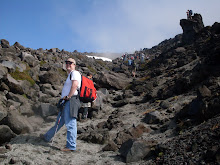In 1980 the General Conference decided to publish a list of "fundamental" beliefs. It is my understanding that it was originally conceived as documentation of the concensus views among members what were the beliefs of the church. Lately there seems to be more and more people attempting to marginalize voices in the church who dissent from the fundamental beliefs. It could be called small tent adventism. This has been combined with attempts to more precisely define the beliefs to allow for less room for interpretation and to shut down internal debate.
The latest evidence for this is the latest General Conference session (meets every five years to approve officers and changes to church operations, but mostly it is a huge cheerleading and networking type of event.) I've been concerned by the tone of some of Ted Wilson's (the new President) comments. Additionally they have decided to affirm the traditional understanding of origins that has been held by the church and request a committee to look at strengthening the wording of the 6th fundamental belief that is concerned with creation and origins. Spectrum Magazine has some good articles about this if you are interested in more details. I particularly liked this segment that discusses statemetns from Ben Clausen of the Geo Science Research Institute.
Quoting from the statement, Dr. Clausen said that "it is impossible," to teach students "scientifically rigorous exposure to and affirmation of our historic belief in a literal, recent six-day creation."
He added: "There are no available models."
"There are no available models." This is a striking admission from somebody who works in an Adventist Apologetics Organization. As a church, we can decide that the earth was created 6000 years ago. But not only is there no evidence for it, but that viewpoint is contradicted by the evidence. "There are no available models." There is no explanation that can adequately deal with the evidence while maintaining a young earth view.
This is a position that basically shuts down any outreach efforts to educated professionals. I once tried to explain the whole La Sierra controversy and young earth creationism to a coworker. Her immediate response was, "who would be stupid enough to believe that!!" I've had several lunch conversations with coworkers. Whenever the topic of creationism versus science is brought up, creationism is thouroughly ridiculed. I am told at church that I should invite my coworkers to church. But why would I invite them to a place that wants them to discard 15 to 20+ years of education in order to fit in?
Of course the people I feel the most sorry for are the professors who work for the church. These are the people who are trying to have this discussion while also maintain their jobs. But as Adventists move more toward making the foundamental beliefs a creed, discussion is becoming more difficult. Talk about a tight rope!
